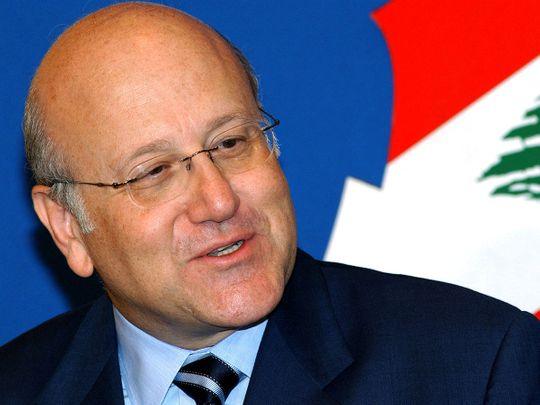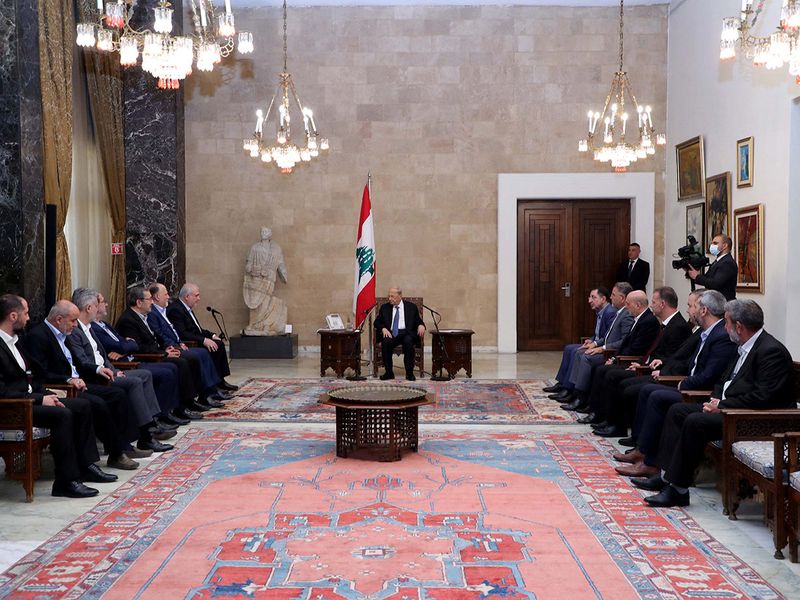
Beirut: Lebanon’s lawmakers designated incumbent Prime Minister Najib Mikati to form a new government on Thursday, more than a month after parliamentary elections that yielded no clear majority.
The 66-year-old billionaire, who had been widely expected to keep his job, secured 54 votes during parliamentary consultations, giving him a clear edge over other potential nominees.
President Michel Aoun subsequently asked him to form a new government, a task analysts fear could take weeks, if not months, despite the economic emergency facing the country.
By convention, Lebanon’s prime ministerial position is reserved for a Sunni, the presidency goes to a Maronite Christian and the post of speaker to a Shiite.
His nearest rival for the position of prime minister-designate was former ambassador to the United Nations Nawaf Salam, who only received 25 votes.
Most of the deputies in Lebanon’s 128-seat parliament chose not to designate any candidate.
Later speaking from the presidential palace in Baabda, Mikati called for political factions in the country to put aside differences and cooperate to ease an economic and financial crisis. He called for cooperation with parliament to approve legislation required to secure an International Monetary Fund bailout.
During consultation talks on Thursday, President Michel Aoun met with political parties and parliamentary blocs representing Lebanon’s 128-seat Chamber of Deputies.
Choosing a prime minister is never an easy task in Lebanon. And it doesn’t always mean that the prime minister-designate will end up forming a government. It sometimes takes weeks, often months, and not all those chosen end up as premiers.
Sa’ad Hariri was famously tasked with forming a government in late 2019. He tried to do just that, for nine whole months, before declining the job last July. In September 2021, Mikati formed his third government, and will now prepare for his fourth. It will probably be the last in President Michel Aoun’s term, which ends in October 2022.
Tycoon from Tripoli
Mikati is a tycoon from the northern city of Tripoli, who heads the Azm Movement. He formed his first cabinet in the aftermath of Rafik Hariri’s assassination in 2005, and returned to the job, first in 2011 and again in September 2021. His most recent comeback was ladened with big promises, like stabilising the Lebanese pound, securing a loan from the International Monetary Fund (IMF), and pursuing justice in the Beirut port blast.
He has succeeded in just one of those three promises, securing preliminary approval from the IMF for $3 billion. That loan is only a fraction of what Lebanon had originally asked for, no less than $9-10 billion.
It also comes with strings attached, a series of serious and painful reforms including floating the exchange rate, monitoring government spending, revamping the electricity sector, combating corruption in the public sector, and allowing external evaluation of the country’s 14 major banks. And finally, the IMF asked Lebanon to issue two laws, one for capital control and another for banking secrecy.

The outgoing Mikati cabinet was formed by consensus of all major parties. The Free Patriotic Movement (FPM) of President Aoun and his son-in-law Gibran Bassil approved it, in exchange for six portfolios, including the strategic ministries of defence, energy, and foreign affairs. They will only support Mikati for another term, and agree to join his government, if he agrees to back Gibran Bassil for president as he plans to nominate himself to succeed his aging-father-in-law next October.
Choosing a president requires a majority vote in parliament, and approval of a sitting prime minister. In fact, it was Hariri’s refusal to make such a pledge that put him in confrontation with the Aounists, who insisted on bringing down his bid by making demands that he could not fulfill.
Mikati remains on cordial terms with the Aounists but will find a hard time supporting Bassil for president. The leader of the FPM is sanctioned by the US for ties to Hezbollah and blamed by a majority of Lebanese for the country’s economic collapse.
Last May, Bassil suffered a setback during the elections, when his bloc was slashed from 29 to 17. His archrival Samir Gagegea, leader of the Lebanese Forces, refused to name anyone for the premiership on Thursday. Geagea remains determined to crush Gibran Bassil’s presidential ambition, and his parliamentary bloc has been increased from 15 to 19 seats, giving him the power to do that.
Heavy blow to Salam
Mikati’s comeback dealt a heavy blow to judge Nawaf Salam, who was nominated for the premiership by a group of 13 independent MPs. All of them newcomers and anti-establishment, representing civil society and the October 17 Revolution. They are backed by 3 MPs of the Phalange Party, an all-Maronite family led by the powerful Gemayel family. They blame the political class—Mikati included—for the country’s economic and political woes.
Now in its third year, financial meltdown has sunk the currency by more than 90%, spread poverty, paralysed the financial system and frozen depositors out of their savings. Independent lawmakers were looking for someone new to lead the nation, and thought Salam would make a good premier.
Salam, 68, is an independent politician, jurist, and diplomat, hailing from a prominent Sunni Muslim family that has worked in politics since Ottoman times. After a teaching career at the American University of Beirut (AUB), he served as Lebanon’s ambassador to the UN and in November 2017, was elected judge on the International Court of Justice. His term in The Netherlands ends in 2027.
In 2019, his name surfaced as a possible contender for the premiership, but he was vetoed by Hezbollah, considered too pro-American.
According to the Hezbollah-backed daily Al Akhbar, Salam met twice with the 13 MPs for seven hours, promising a cabinet of technocrats chosen for their professional merit, rather than political affiliation.
Traditional political parties were not too enthusiastic about Nawaf Salam, however. The Amal Movement of Parliament Speaker Nabih Berri wanted to keep Mikati as premier, and voted in his favour on Thursday. So did their allies in Hezbollah. Combined the two Shiite parties have a total of 27 votes in Parliament. They also control a handful of posts in the outgoing Mikati cabinet, including culture, finance, agriculture, and public works.
Also supporting Mikati was Druze leader Walid Jumblatt, who controls all his constituencies in Parliament (a total of 9 MPs). Another 16 Sunni MPs, some being former members of Hariri’s Future Movement, have shown support for Mikati.
Meanwhile, speaking to reports ahead of the consultations, Geagea told reporters: “The two names currently being discussed don’t meet our criteria (for premier).”
-- With inputs from AFP








